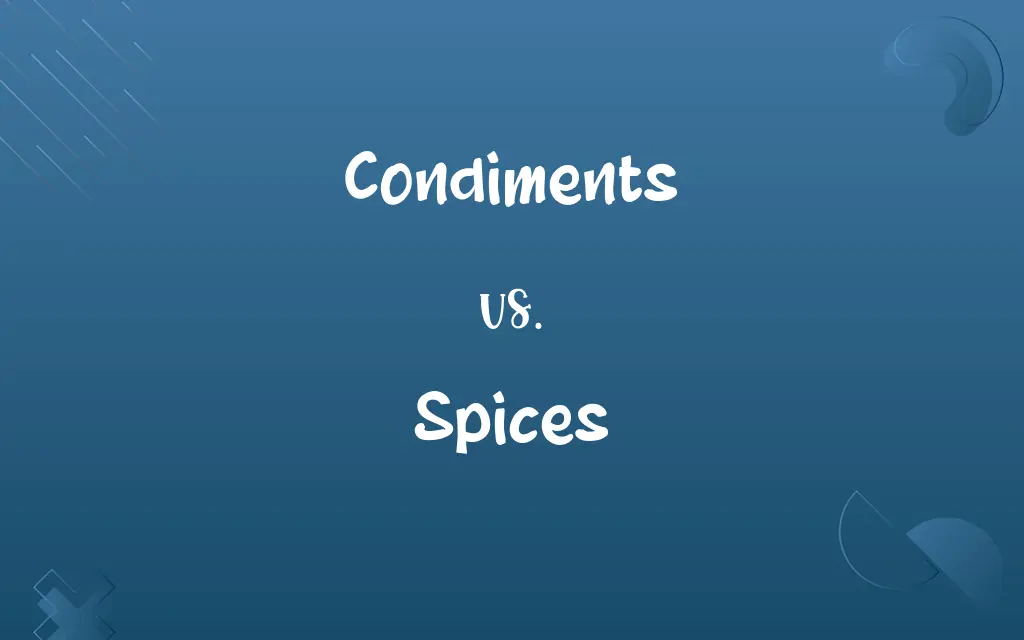Condiments vs. Spices: Know the Difference

By Shumaila Saeed & Hifza Nasir || Published on March 22, 2024
Condiments are substances added to food to enhance flavor or complement a dish, such as ketchup or mustard, while spices are dried seeds, fruits, roots, or bark used for seasoning, like cinnamon or pepper.

Key Differences
Condiments and spices both play crucial roles in culinary arts, enhancing and complementing the flavors of food. Condiments are typically used in their prepared form and added at the table, such as ketchup, mustard, and mayonnaise, offering a wide range of flavors from sweet to tangy. Spices, on the other hand, include dried seeds, fruits, roots, or bark, used in cooking to season and flavor food, examples being cinnamon, pepper, and cardamom. They are usually added during the cooking process to imbue dishes with their distinctive flavors and aromas.
Hifza Nasir
Mar 22, 2024
The versatility of condiments allows them to be used across various cuisines, adaptable to different dishes as flavor enhancers or complements. They can be either store-bought or homemade, with recipes varying widely by culture, such as soy sauce in Asian cuisine or salsa in Mexican dishes. Spices, with their potent flavors and aromas, are integral to the identity of many regional cuisines, defining dishes like Indian curries or Middle Eastern kebabs. Their use is ancient, dating back thousands of years for culinary and medicinal purposes.
Hifza Nasir
Mar 22, 2024
Condiments often serve as a final touch, allowing individuals to tailor a dish to their taste preferences at the moment of consumption. They can be applied liberally or sparingly, depending on personal preference. Spices require a more measured approach, with their amounts and combinations carefully considered during cooking to achieve the desired flavor profile without overpowering the dish.
Shumaila Saeed
Mar 22, 2024
Health aspects also differentiate condiments and spices. Many condiments, especially those that are commercially produced, can be high in sugar, salt, or fat, contributing to their rich flavors but also raising health concerns if consumed in large amounts. Spices, conversely, are known for their health benefits, including anti-inflammatory and antioxidant properties, with many used in traditional medicine.
Shumaila Saeed
Mar 22, 2024
The storage and shelf life of condiments and spices also vary. While condiments, particularly those opened or homemade, often require refrigeration and have a limited shelf life, spices can last longer when stored properly in a cool, dry place, maintaining their potency over months or even years.
Hifza Nasir
Mar 22, 2024
ADVERTISEMENT
Comparison Chart
Definition
Substances added to food to enhance flavor or complement it.
Dried seeds, fruits, roots, or bark used for seasoning.
Hifza Nasir
Mar 22, 2024
Usage
Added at the table or to prepared dishes.
Incorporated during the cooking process.
Shumaila Saeed
Mar 22, 2024
Health Impact
Can be high in sugar, salt, or fat.
Known for anti-inflammatory and antioxidant properties.
Shumaila Saeed
Mar 22, 2024
Storage & Shelf Life
Often require refrigeration once opened; shorter shelf life.
Stored in a cool, dry place; longer shelf life.
Dua Fatima
Mar 22, 2024
ADVERTISEMENT
Condiments and Spices Definitions
Condiments
Often used at the table.
Salt and pepper are common table condiments.
Shumaila Saeed
Feb 29, 2024
Spices
Used in both sweet and savory dishes.
Nutmeg is used in desserts and savory dishes alike.
Hifza Nasir
Feb 29, 2024
Condiments
A substance used to add flavor to food.
She added mustard to her sandwich for extra flavor.
Hifza Nasir
Feb 29, 2024
Spices
Can enhance color and aroma.
Turmeric adds a vibrant yellow color and a warm aroma to dishes.
Dua Fatima
Feb 29, 2024
Condiments
Can be sweet, savory, or spicy.
Honey mustard is a sweet and tangy condiment.
Hifza Nasir
Feb 29, 2024
ADVERTISEMENT
Spices
Integral to seasoning blends.
Curry powder is a blend of several spices.
Shumaila Saeed
Feb 29, 2024
Condiments
Any sauce or seasoning added to food.
He topped his hot dog with ketchup and relish.
Shumaila Saeed
Feb 29, 2024
Spices
Offers health benefits.
Ginger is a spice known for its digestive health benefits.
Shumaila Saeed
Feb 29, 2024
Condiments
Includes dressings and spreads.
Mayonnaise is a popular condiment for sandwiches.
Shumaila Saeed
Feb 29, 2024
Spices
A dried part of a plant used for flavoring.
Cinnamon is a spice made from the bark of trees.
Hifza Nasir
Feb 29, 2024
Condiments
A substance, such as a relish, vinegar, or spice, used to flavor or complement food.
Shumaila Saeed
Feb 28, 2024
Spices
Any of various pungent, aromatic plant substances, such as cinnamon or nutmeg, used to flavor foods or beverages.
Shumaila Saeed
Feb 28, 2024
Repeatedly Asked Queries
How are condiments used?
Condiments are typically added to food at the table or to prepared dishes to adjust the flavor to individual tastes.
Shumaila Saeed
Mar 22, 2024
Are condiments unhealthy?
Some condiments, especially commercial ones, can be high in sugar, salt, or fat, but their health impact largely depends on the amount consumed.
Dua Fatima
Mar 22, 2024
What are condiments?
Condiments are substances added to food to enhance its flavor or complement it, such as sauces, dressings, and spreads.
Hifza Nasir
Mar 22, 2024
Do spices have health benefits?
Many spices are known for their health benefits, including anti-inflammatory and antioxidant properties.
Shumaila Saeed
Mar 22, 2024
What's a common example of a spice?
Black pepper is one of the most commonly used spices worldwide.
Shumaila Saeed
Mar 22, 2024
Can spices be used as condiments?
While spices are generally used during cooking, some, like pepper, can also be used as condiments when added to prepared food.
Shumaila Saeed
Mar 22, 2024
What's a common example of a condiment?
Ketchup is a widely used condiment, especially in Western cuisine.
Shumaila Saeed
Mar 22, 2024
How should condiments be stored?
Many condiments require refrigeration once opened and should be used within a recommended time frame for best quality.
Dua Fatima
Mar 22, 2024
How should spices be stored?
Spices should be stored in a cool, dry place to maintain their potency over time.
Shumaila Saeed
Mar 22, 2024
Can I make my own condiments?
Yes, many condiments can be made at home with simple ingredients and recipes.
Shumaila Saeed
Mar 22, 2024
What are spices?
Spices are dried parts of plants, like seeds, fruits, roots, or bark, used for seasoning and flavoring food.
Shumaila Saeed
Mar 22, 2024
How are spices used?
Spices are incorporated during the cooking process to season and flavor the food.
Dua Fatima
Mar 22, 2024
Can using spices reduce the need for salt?
Yes, using spices can enhance the flavor of food, potentially reducing the need for additional salt.
Dua Fatima
Mar 22, 2024
Are all spices hot in flavor?
No, spices can range from sweet, like cinnamon, to very hot, like cayenne pepper.
Shumaila Saeed
Mar 22, 2024
Do condiments expire?
Yes, condiments have expiration dates, but their shelf life can vary widely based on the type and storage conditions.
Hifza Nasir
Mar 22, 2024
Share this page
Link for your blog / website
HTML
Link to share via messenger
About Author
Written by
Shumaila SaeedShumaila Saeed, an expert content creator with 6 years of experience, specializes in distilling complex topics into easily digestible comparisons, shining a light on the nuances that both inform and educate readers with clarity and accuracy.
Co-written by
Hifza Nasir







































































